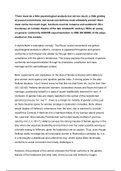Essay
Essay English Studies - Introduction To Drama (ENGL1011) The Rover, ISBN: 9781170756515
- Institution
- Durham University (DUT)
- Book
- The Rover
This essay is from first year English Literature at Durham University. It responds to the exploitations and reinforcements of generic conformity and experimentation of the restoration comedy 'The Rover' by Aphra Behn and how both concepts detract and compliment each other. It discusses in detail th...
[Show more]




